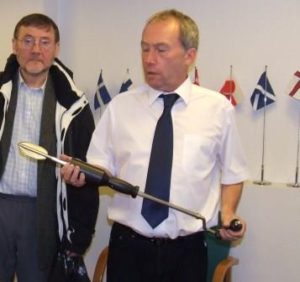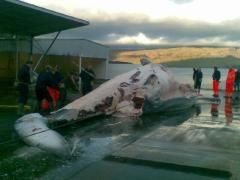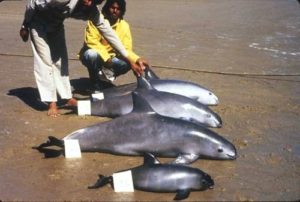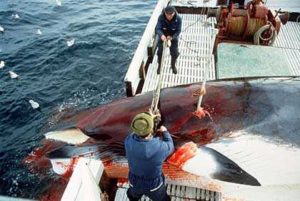22nd May 2017
84 long-finned pilot whales were driven ashore and slaughtered last weekend in the first whale hunt of the year in the Faroe Islands. The whales were killed on the island of Vagar, close to the Faroe Island’s airport. Last year, a total of 295 whales were killed in five whale hunts or ‘grinds’ as they are known.
 An average of 800 pilot whales or more are killed each year in the Faroes, a group of islands situated midway between Scotland and Iceland. The meat from the whales is distributed for human consumption despite repeated warnings that it is dangerously contaminated with toxic pollutants like mercury and PCBs (Polychlorinated Biphenyls).
An average of 800 pilot whales or more are killed each year in the Faroes, a group of islands situated midway between Scotland and Iceland. The meat from the whales is distributed for human consumption despite repeated warnings that it is dangerously contaminated with toxic pollutants like mercury and PCBs (Polychlorinated Biphenyls).
In 2008, health leaders urged the Faroese to stop eating whale meat and blubber. In 2012, further health studies showed these toxins, which attack the nervous, immune and reproductive systems, are having a serious impact on the health of the Faroese population.
PCBs were manufactured from the 1920s and banned in the 1980s because of their wide-ranging impact on human and animal health, from links to cancer, to suppressing the immune system and causing reproductive problems. A staggering 2 million tons of PCBs were manufactured around the world and most of this poison is slowly leaking from landfill sites into rivers, estuaries and eventually into the sea. These, and other toxic chemicals like mercury, are known to concentrate in top marine predators, including pilot whales, orcas and other dolphin species.
In January 2016, a scientific report highlighted the threat posed by these pollutants in the seas around Western Europe. The researchers found PCBs in the bodies of over 1,000 dolphins and orcas, examined over 20 years, at levels greatly exceeding those known to cause severe toxic effects.
Campaign Whale is working with Faroese people in the Faroes to end whaling. Director Andy Ottaway said “Sooner or later the Faroese must accept the fact that killing and eating pilot whales belongs in the past, not least because the poisons in the whales are also a threat to the people eating them”













